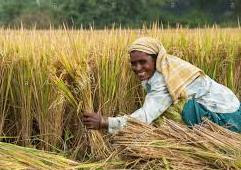A LENTEN PILGRIMAGE
Rev. Fr. K M George
The Field
Rice is the staple food for the people of Kerala in India . But ask the younger generation of Malayalees[1] whether they have ever observed at close quarters the process of cultivating rice - the arduous and meticulous process of preparing the ground and the seeds, the act of sowing the seeds and watering the field, the weeding and the waiting, the happy harvest and the gathering of paddy..
Most young people will answer in the negative. In our generation we have nearly stopped cultivating rice in many parts of Kerala, and started importing our daily food.
When Jesus told the people in Palestine the parable of the sower,
(A sower went out to sow his seed...Luke 8:5-8) everybody understood the image immediately.
The Lenten prayers adopt the image of the field from the agricultural parables of Christ. The forty days stand for the field of history. It is also the field of our life span. We are the farmers. How are we going to use the field?
If we entrust an arable piece of land to a good farmer, he knows what to do with that. With his sweat and labour he would convert it to a fertile field where he can sow the seeds.
There are several different uses of the metaphor of the field in Jesus' teachings. One of them is to consider the field as representing the needy world - the world of hunger and poverty, the world of conflict and quarrel, the world of injustice and oppression of the poor. What do we do with that kind of field when we are in a period of fasting and prayer?
We usually expect a beggar to come to the gate of our house and stretch his hands to us so that we can give charity. This gives us a sort of self-satisfaction. We imagine that we have done our duty and that we are going to get the heavenly reward.
A Lenten hymn denounces this attitude. It says:
“Do you expect the field to come to the farmer to be cultivated? Is it not rather the farmer who goes out to the field, carrying the seeds, in order to cultivate it? Therefore, you must not wait for the needy persons to come to you, but on the contrary, go out to them, and look after those who are in need and distress.”
This reminds us of the shepherd who goes out at great risk to look for the lost sheep.
This is the basis for Orthodox Christian ethics and pastoral care. We run the risk of becoming self-complacent about our fasting and prayer, the austerities we practise etc.
We would then assume that we are the righteous ones, and all the world should come to us. In fact, the Lenten prayers exhort us to take the other attitude: The world is the field. Our life span is the field. We should earnestly go out with the seeds of justice and truth, care and concern for the people in need. We should make use of every day of our life span to practise compassion and bring joy and peace to the world in need.
“For God so loved the world that he gave his only begotten Son ..”
(John 3:16)





No comments:
Post a Comment